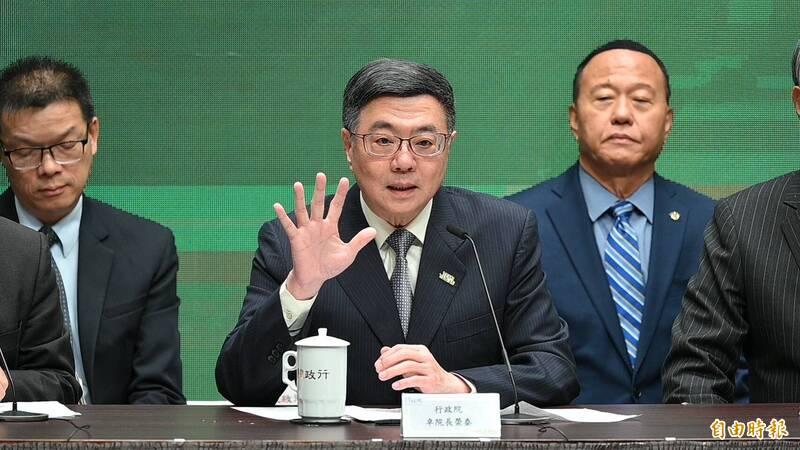The budget cuts being proposed by the opposition would destabilize the country, slow down development and create weaknesses that Taiwan’s enemies could exploit, Premier Cho Jung-tai (卓榮泰) told a press conference today.
The Chinese Nationalist Party (KMT) and Taiwan People’s Party (TPP) have proposed that significant reductions and freezes be made to the central government’s budget, with a total of over 3,000 proposals being put forward.
There are five main areas where the proposed cuts would impact the country — national competitiveness, undermining defense capabilities, slowing technological advancement, reducing public services and diminishing the government’s ability to communicate to the public, Cho said.

Photo: Tu Chien-jung, Taipei Times
Current economic development projects like providing support for small businesses, subsidizing new long-term care options for the elderly and promoting youth employment opportunities would no longer be possible, he added.
The budget proposals would directly impact progress in carbon neutrality goals, academic research, human rights protections and other programs, he said.
When asked whether the Executive Yuan would propose a review of the budget, Cho said that while it is the Executive Yuan’s right to do so, it would depend on the Legislative Yuan’s actions.
To propose a review, the Executive Yuan would need approval from President William Lai (賴清德), who has his own perspective on how to act in the country’s best interest, Cho added.
Cho called on lawmakers to exercise their budget oversight power cautiously, rather than engage in retaliatory cuts driven by personal grievances.
The KMT said it has every right to monitor the government budget and safeguard taxpayers’ money, adding that the ruling Democratic Progressive Party should try to convince the public by providing good reasons to support their spending plans.

An essay competition jointly organized by a local writing society and a publisher affiliated with the Chinese Communist Party (CCP) might have contravened the Act Governing Relations Between the People of the Taiwan Area and the Mainland Area (臺灣地區與大陸地區人民關係條例), the Mainland Affairs Council (MAC) said on Thursday. “In this case, the partner organization is clearly an agency under the CCP’s Fujian Provincial Committee,” MAC Deputy Minister and spokesperson Liang Wen-chieh (梁文傑) said at a news briefing in Taipei. “It also involves bringing Taiwanese students to China with all-expenses-paid arrangements to attend award ceremonies and camps,” Liang said. Those two “characteristics” are typically sufficient

A magnitude 5.9 earthquake that struck about 33km off the coast of Hualien City was the "main shock" in a series of quakes in the area, with aftershocks expected over the next three days, the Central Weather Administration (CWA) said yesterday. Prior to the magnitude 5.9 quake shaking most of Taiwan at 6:53pm yesterday, six other earthquakes stronger than a magnitude of 4, starting with a magnitude 5.5 quake at 6:09pm, occurred in the area. CWA Seismological Center Director Wu Chien-fu (吳健富) confirmed that the quakes were all part of the same series and that the magnitude 5.5 temblor was

The brilliant blue waters, thick foliage and bucolic atmosphere on this seemingly idyllic archipelago deep in the Pacific Ocean belie the key role it now plays in a titanic geopolitical struggle. Palau is again on the front line as China, and the US and its allies prepare their forces in an intensifying contest for control over the Asia-Pacific region. The democratic nation of just 17,000 people hosts US-controlled airstrips and soon-to-be-completed radar installations that the US military describes as “critical” to monitoring vast swathes of water and airspace. It is also a key piece of the second island chain, a string of

The Central Weather Administration has issued a heat alert for southeastern Taiwan, warning of temperatures as high as 36°C today, while alerting some coastal areas of strong winds later in the day. Kaohsiung’s Neimen District (內門) and Pingtung County’s Neipu Township (內埔) are under an orange heat alert, which warns of temperatures as high as 36°C for three consecutive days, the CWA said, citing southwest winds. The heat would also extend to Tainan’s Nansi (楠西) and Yujing (玉井) districts, as well as Pingtung’s Gaoshu (高樹), Yanpu (鹽埔) and Majia (瑪家) townships, it said, forecasting highs of up to 36°C in those areas